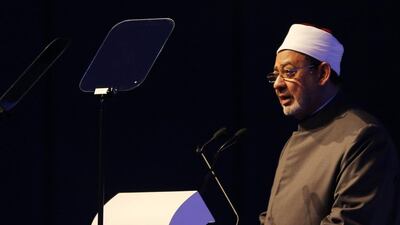JAKARTA // Different streams of religious thought are natural and should not prevent unity between Muslims, said the Grand Imam of Al Azhar University in Cairo.
Speaking on Monday at the Indonesian Council of Muslim Scholars, Dr Ahmed El Tayyeb called for Sunnis and Shiites to unite.
He said the council, which scholars from the UAE attended, was “where all scholars unite in one place despite their different religious schools”.
Dr Ahmed El Tayyeb said: “Indonesia was a leading country in achieving a long-time dream we all had but has been difficult to achieve – which is for all scholars to unite in one place.”
When scholars debated their differences in the public domain, it led to clashes between various groups, he said.
On tackling religious extremism, Dr El Tayyeb said “the one and only solution” was for all Islamic groups to unite and the “reconciliation of scholars”.
Some Islamic groups, he said, produced “bitter fruit” from spreading notions that they were right and accused anyone who disagreed with them of apostasy.
“We should accept that differences never disappeared and never will,” the Grand Imam said. “If the handprints of people are never the same, how do they expect the mindprint to be?”
Because conflicts in the Middle East resulted from the sectarian schism between Sunnis and Shiites, Dr El Tayyeb urged Islamic scholars from Iraq, Syria and Yemen to meet in Al Azhar University “and reach an agreement that neither Sunnis accuse Shiites of apostasy, nor Shiites accuse Sunnis of that”.
Over in Indonesia, the country was not free of such conflicts, said Huzaima Yangu, the head of fatwa at the Indonesian Council of Muslim Scholars.
“Many extremists have been calling for fatwas that accuse Shiites of aberration, but no such fatwas had been issued,” she said.
Marouf Ameen, head of the council, said that “Islamic unity does not mean erasing variety in the ummah [community of Muslims]”.
He named five major Islamic societies in Indonesia that have different views and religious programmes, yet were “in agreement that these differences should not give rise to clashes and hatred between them”.
The Islamic scholars and experts meet under the aegis of the council, which coordinates their educational and preaching programmes.
The council is also the official body that issues fatwas in Indonesia, and there is no grand mufti. The fatwas issued by the council are more readily accepted by the ummah since they include all the Islamic societies in the country.
“We reached the understanding that variety leads to development and luxury,” Mr Ameen said. “We are also completely aware that reaching unity is not easy, we found different challenges in front of us.”
He pointed to the challenge caused by the spread of secularism, which had the aim of “removing religious spirit from everyday life”.
This led to radicalism in interpreting religious texts “whether secularism is a radical move or a liberal one”, Mr Ameen said.
Misinterpretation of religion could lead to a contrary, radical positions that extremists have adopted.
“We ask through your visit to give us guidance and advice on how to solve those challenges,” he told the Muslim Council of Elders.
Led by Dr El Tayyeb, the council was invited by Indonesia’s president to visit and share ideas with the country’s Islamic scholars and students.
hdajani@thenational.ae


